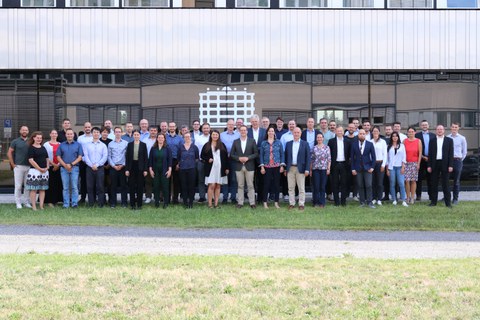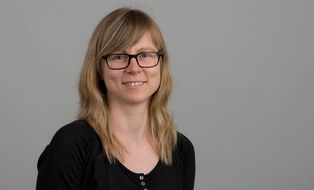Nov 25, 2024
Starting signal for new SFB/TRR project - millions in funding for pioneering lightweight engineering technologies

Participants of the Collaborative Research Centre / Transregio 402.
In November 2024, the German Research Foundation (DFG) announced the funding of the new Collaborative Research Center/Transregio (SFB/TRR 402). Entitled "Intelligent production technologies for lightweight plastic structures with load-dedicated 3D grading of the reinforcement architecture (DediGrad)", the project involves a collaboration between TUD Dresden University of Technology and the partners TU Chemnitz, RWTH Aachen University, TU Vienna and Fraunhofer IWU. The total funding of 16.4 million euros will be used over the next 3 ¾ years to develop advanced production technologies for resource-efficient and sustainable lightweight structures. The project not only strengthens the scientific excellence of the Dresden region, but also continues to position TU Dresden as a stakeholder in interdisciplinary basic research.
The SFB/TRR 402 pursues the ambitious goal of creating lightweight structures that are both resilient and fully recyclable thanks to innovative material combinations and production technologies. The components should be able to meet the highest performance requirements. They are used in various industries - from the automotive and aviation sectors to rail transportation. The project has the potential to revolutionize the production processes of many industries and contribute to a more climate-friendly future.
In the first phase of the project, the focus is on developing technologies to integrate continuous and discontinuous fiber reinforcements. The combination of these fibre types will enable a tailor-made material design that not only optimizes mechanical properties but also ensures suitability for efficient mass production. Particular attention is paid to 3D grading, in which material transitions are designed to be fluid in order to address different load requirements in a targeted manner.
The long-term goal is to significantly reduce both energy consumption and CO₂ emissions in the production and operation of vehicles and machines and to optimize production processes. The aim is to create a holistically sustainable value chain that minimizes the ecological footprint of products over their entire life cycle.
Core research areas of the Institute of Lightweight Engineering and Polymer Technology (ILK) in the SFB/TRR 402
Under the leadership of board member Prof. Dr. habil. Maik Gude, the ILK is directly involved in four projects within the SFB/TRR 402. These projects aim to develop advanced technologies and construction methods that enable the targeted control of graded material properties and optimize the potential of lightweight materials. The precise design of transitions between different material zones plays a crucial role in the performance of the resulting components. One project focuses on the integration and alignment of magnetically coated carbon fibers (mc-CF) in polymer matrices. By applying external magnetic fields, the fiber orientation can be precisely controlled, which is particularly important for manufacturing components that must meet application-specific requirements regarding both load-bearing capacity and service life. Another project addresses the development of innovative preforming methods combined with laser-based pretreatment technologies. Notably, the use of woven structures, which can be structured through laser treatment and then processed into high-performance components using compression molding, is a key aspect. In a further project, the ILK is working on the computer-aided design of modular tool systems to manage the complexity of manufacturing while enhancing flexibility and efficiency.
To characterize the planned graded material composites, the ILK is engaged in a fourth project involving hybrid data spaces, which will allow detailed capture and analysis of complex process-structure-property relationships. This enables precise optimization of the developed technologies and ensures that the targeted material properties can be realized in practical applications.
We look forward to the collaboration within the SFB/TRR 402 and are excited to develop innovative solutions together with our partners, supported by the DFG, that will make a significant contribution to the advancement of lightweight technologies.
 © Kirsten Lassig
© Kirsten Lassig
Dr.-Ing. Anja Winkler
Unit Composites
Send encrypted email via the SecureMail portal (for TUD external users only).
- TU Chemnitz
- RWTH Aachen
- TU Vienna
- Fraunhofer IWU
Project partner at the TU Dresden:
- Institute of Mechatronic Engineering (IMD)
- Institute of Manufacturing (IF)
- Institute of Machine Elements and Machine Design (IMM)
